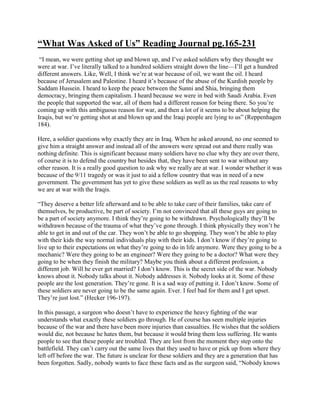
What Was Asked of Us Reading Journal #4
- 1. HYPERLINK quot; http://nicoletorralba.wordpress.com/2010/04/13/%e2%80%9cwhat-was-asked-of-us%e2%80%9d-reading-journal-pg-165-231/quot; quot; Permanent Link to What Was Asked of Us Reading Journal pg.165-231quot; “What Was Asked of Us” Reading Journal pg.165-231<br /> “I mean, we were getting shot up and blown up, and I’ve asked soldiers why they thought we were at war. I’ve literally talked to a hundred soldiers straight down the line—I’ll get a hundred different answers. Like, Well, I think we’re at war because of oil, we want the oil. I heard because of Jerusalem and Palestine. I heard it’s because of the abuse of the Kurdish people by Saddam Hussein. I heard to keep the peace between the Sunni and Shia, bringing them democracy, bringing them capitalism. I heard because we were in bed with Saudi Arabia. Even the people that supported the war, all of them had a different reason for being there. So you’re coming up with this ambiguous reason for war, and then a lot of it seems to be about helping the Iraqis, but we’re getting shot at and blown up and the Iraqi people are lying to us” (Reppenhagen 184).<br />Here, a soldier questions why exactly they are in Iraq. When he asked around, no one seemed to give him a straight answer and instead all of the answers were spread out and there really was nothing definite. This is significant because many soldiers have no clue why they are over there, of course it is to defend the country but besides that, they have been sent to war without any other reason. It is a really good question to ask why we really are at war. I wonder whether it was because of the 9/11 tragedy or was it just to aid a fellow country that was in need of a new government. The government has yet to give these soldiers as well as us the real reasons to why we are at war with the Iraqis.<br />“They deserve a better life afterward and to be able to take care of their families, take care of themselves, be productive, be part of society. I’m not convinced that all these guys are going to be a part of society anymore. I think they’re going to be withdrawn. Psychologically they’ll be withdrawn because of the trauma of what they’ve gone through. I think physically they won’t be able to get in and out of the car. They won’t be able to go shopping. They won’t be able to play with their kids the way normal individuals play with their kids. I don’t know if they’re going to live up to their expectations on what they’re going to do in life anymore. Were they going to be a mechanic? Were they going to be an engineer? Were they going to be a doctor? What were they going to be when they finish the military? Maybe you think about a different profession, a different job. Will he ever get married? I don’t know. This is the secret side of the war. Nobody knows about it. Nobody talks about it. Nobody addresses it. Nobody looks at it. Some of these people are the lost generation. They’re gone. It is a sad way of putting it. I don’t know. Some of these soldiers are never going to be the same again. Ever. I feel bad for them and I get upset. They’re just lost.” (Hecker 196-197).<br />In this passage, a surgeon who doesn’t have to experience the heavy fighting of the war understands what exactly these soldiers go through. He of course has seen multiple injuries because of the war and there have been more injuries than casualties. He wishes that the soldiers would die, not because he hates them, but because it would bring them less suffering. He wants people to see that these people are troubled. They are lost from the moment they step onto the battlefield. They can’t carry out the same lives that they used to have or pick up from where they left off before the war. The future is unclear for these soldiers and they are a generation that has been forgotten. Sadly, nobody wants to face these facts and as the surgeon said, “Nobody knows about. Nobody talks about. Nobody addresses it. Nobody looks at it” (Hecker 196). This is the reality of the world today.<br />